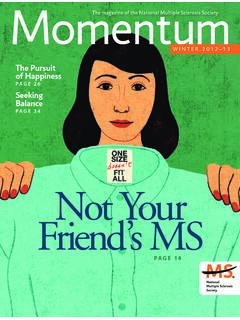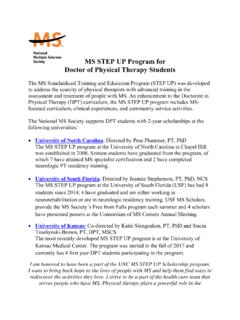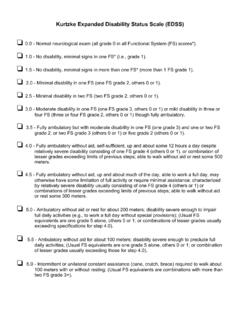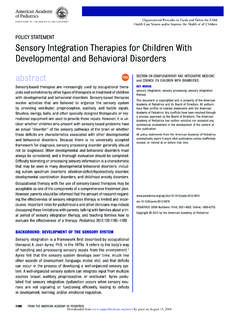Transcription of nationalMSsociety.org/DMT
1 Updated May 2018. Please check for the most current version of this publication. For some people, a diagnosis of multiple sclerosis (MS) is a relief, giving a name and a reason for a parade of strange symptoms. For others, a diagnosis of MS brings frightening images of a challenging future. Regardless of one's initial reactions, the diagnosis of MS is a life-changing event. Even before the news can be fully absorbed, people with MS face decisions about taking a disease - modifying medication, including when to start treatment and which one of the many available options is best suited to their individual needs. Early and ongoing treatment with a Food and Drug Administration (FDA)-approved therapy can make a difference for people with MS. Learn about your options by talking to your healthcare professional and contacting the National MS Society at or 1-800-344-4867. This booklet outlines the issues to consider with one's healthcare provider when choosing a treatment and describes the resources available to support a person's efforts to start and continue treatment.
2 disease - modifying therapies disease - modifying therapies (also called DMTs, disease - modifying medications or disease - modifying treatments) are a key component of comprehensive MS care, along with managing MS relapses (also called exacerbations or attacks), treating symptoms, and paying attention to one's overall health and wellness. The disease - modifying medications are the best strategy currently available to slow the natural course of MS. Even though these medications don't generally make a person feel better, they can be looked upon as an investment in the future. Clinical studies have demonstrated that all of these medications: Reduce the frequency and severity of clinical attacks (also called relapses or exacerbations). An attack is defined as the worsening of an MS symptom or symptoms, and/or the appearance of new symptoms, which lasts at least 24 hours and is separated from a previous exacerbation by at least one month.
3 In clinical trials comparing treatment versus inactive placebo, these agents reduced MS attacks by 28-68 percent. Reduce the development of new lesions (damaged/scarred or active disease areas) within the brain and spinal cord as seen on MRI. disease - modifying therapies for MS | National MS Society 1. (magnetic resonance imaging). In clinical trials, most people receiving the active treatment were also found to have fewer, smaller or no new lesions on MRI scans. Appear to slow down the accumulation of disability. In clinical trials, some of these medications have been shown to delay disability progression. Subsequent clinical investigation and clinical experience have indicated that early intervention with disease - modifying therapies may help to prevent permanent damage in the central nervous system (which is made up of the brain, spinal cord and optic nerves). Permanent damage to nerve fibers (axons) occurs early in MS in association with the destruction of myelin.
4 Overall brain atrophy (shrinkage) can occur early in the disease , and damage can be ongoing even when a person has no symptoms and feels well. For all of these reasons, the MS Coalition consensus on disease - modifying therapy emphasizes the importance of early and ongoing treatment as follows: Starting treatment with an FDA-approved disease - modifying therapy as soon as possible is recommended: When a person has been diagnosed with relapsing MS. If a person has had a first episode of neurologic symptoms, MRI. findings consistent with MS, and other possible causes have been ruled out When an individual has been diagnosed with secondary- progressive MS (SPMS) but continues to have active disease (relapses and/or inflammatory changes on MRI). Treatment with any disease - modifying therapy should be continued indefinitely, unless any of the following occur (in which case a different disease - modifying therapy should be considered): The individual and his or her healthcare provider determine that the treatment is not controlling the disease adequately The side effects are intolerable A person is unable to follow the recommended treatment regimen A more appropriate treatment becomes available disease - modifying therapies for MS | National MS Society 2.
5 None of these medications is approved by the FDA for women who are pregnant or plan to become pregnant, or who are breastfeeding. It is important for women to discuss their plans for pregnancy with their healthcare provider so that they can decide together the best and safest treatment plan. To read the MS Coalition consensus paper, visit Options There are currently over a dozen disease - modifying medications approved by the FDA for use in relapsing forms of MS (including secondary-progressive MS. for those people who are still experiencing relapses). Of these, one is also approved specifically for primary-progressive MS, and one is the only medication approved for use in children age 10 and older. None of these medications is a cure and none will prevent recurring symptoms, such as fatigue or numbness. However, each of them has a proven record of effectiveness. The decision to take a disease - modifying therapy is best made through careful consideration of the disease course you are experiencing, your lifestyle and the known side effects and potential risks and benefits of each of the therapies .
6 A full discussion with a knowledgeable healthcare professional is the best guide for your choice among the available options. Each person's body or disease can respond to these medications in different ways and the medication that is the best option for one person may not be the best option for another person. In addition, a medication that adequately controls your disease today may not do so in the future, and you may need to change to a different medication. Fortunately, today people have access to a variety of effective medications that work in different ways in the body. disease - modifying therapies for MS | National MS Society 3. Table of Contents Important Information .. 5. Injectable 5. Oral Treatments .. 10. Intravenous Infusion Treatments .. 12. Managing side effects of disease - modifying therapies .. 16. Understanding the warnings in the FDA labeling 16. Injectable Medications.
7 16. Avonex Warnings .. 17. Betaseron Warnings .. 17. Copaxone Warnings .. 17. Extavia Warnings .. 18. GlatopaTM Warnings .. 18. Plegridy Warnings .. 18. Rebif Warnings .. 19. Zinbryta Warnings (Removed from Market March 2018) .. 19. Oral Medications .. 20. Aubagio Warnings .. 20. Gilenya Warnings .. 21. Tecfidera Warnings .. 22. Infused Medications .. 23. Lemtrada Warnings .. 23. Novantrone Warnings .. 24. Ocrevus Warnings .. 25. Tysabri Warnings .. 26. Work with your healthcare provider to optimize your treatment .. 28. The bottom line .. 28. Paying for a disease - modifying therapy: Some help is available .. 29. Industry-Sponsored Sites for Patient Information and/or Financial 30. Help with the cost of medications for symptom management .. 31. A recommended resource .. 31. disease - modifying therapies for MS | National MS Society 4. Important Information Injectable Treatments Treatment (chemical name) Dose/.
8 FDA Approval Most Common Side Effects Administration Manufacturer Avonex 30 mcg For the treatment adults with of relapsing Headache, flu-like symptoms (chills, (interferon beta-1a) intramuscularly forms of MS to slow the accumulation of fever, muscle pain, fatigue weakness), (into a large muscle) physical disability and reduce the injection site pain and inflammation Biogen once weekly frequency of clinical exacerbations, and for adult patients who have experienced a first See warnings on page 16. clinical episode and have MRI features consistent with MS. Approved: 1996 US; 1998 CAN. Pregnancy Category C (see footnote, page 9. disease - modifying therapies for MS | National MS Society 5. Injectable Treatments Treatment (chemical name) Dose/. FDA Approval Most Common Side Effects Administration Manufacturer Betaseron mg For the treatment of adults with relapsing Flu-like symptoms (chills, fever, muscle (interferon beta-1b) subcutaneously forms of MS to reduce the frequency of pain, fatigue, weakness) following (under the skin) clinical exacerbations; and for adult injection, headache, injection site Bayer Healthcare every other day patients who have experienced a first reactions (swelling redness, pain), Pharmaceuticals Inc.)
9 Clinical episode and have MRI features injection site skin breakdown, low white consistent with MS blood cell count Approved for RRMS: 1993 US; 1995 CAN See warnings on page 17. Approved for SPMS: 1995 CAN. Pregnancy Category C (see footnote, page 9). Copaxone 20 mg For the treatment of adults with relapsing Injection site reactions (redness, pain, (glatiramer acetate) subcutaneously forms of MS swelling), flushing, shortness of every day, or breath, rash, chest pain Teva Neuroscience Approval: 1996 US; 1997 CAN. 40 mg See warnings on page 17. subcutaneously Pregnancy Category B (see footnote, page 9). three times per week disease - modifying therapies for MS | National MS Society 6. Injectable Treatments Treatment (chemical name) Dose/. FDA Approval Most Common Side Effects Administration Manufacturer Extavia mg For the treatment of adults with relapsing Flu-like symptoms (chills, fever, muscle (interferon beta-1b) subcutaneously forms of MS to reduce the frequency of pain, fatigue, weakness) following every other day clinical exacerbations; and for adult injection, headache, injection site Novartis patients who have experienced a first reactions (swelling redness, pain).
10 Pharmaceuticals clinical episode and have MRI features consistent with MS See warnings on page 18. Approval: 2009 US; 2009 CAN. Pregnancy Category C (see footnote, page 15). Glatopa 20 mg For the treatment of adults with relapsing Injection site reactions (redness, pain, (glatiramer acetate, subcutaneously forms of MS swelling). generic equivalent of every day Copaxone 20 mg) Approval: 2015 US See warnings on page 18. Sandoz a Novartis Pregnancy Category B (see footnote, page 9). company Plegridy 125 mcg For the treatment of adults with relapsing Flu-like symptoms (chills, fever, muscle (pegylated subcutaneously forms of MS pain, fatigue, weakness, headache, interferonbeta-1a) every 14 days itching). Injection site reactions Approval: 2014 US (swelling, redness, pain). Biogen Pregnancy Category C (see footnote, page 15) See warnings on page 18. disease - modifying therapies for MS | National MS Society 7.















